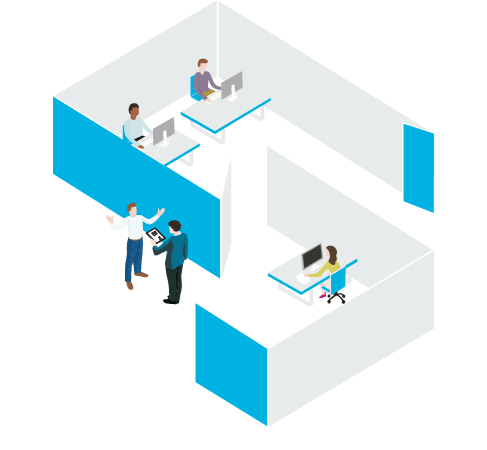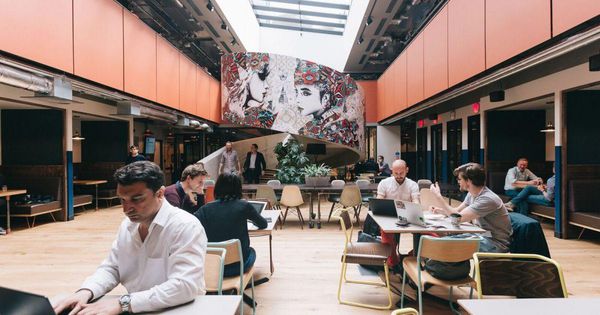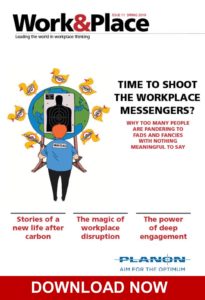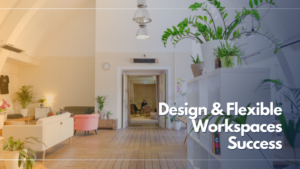When you enter one of the 287 WeWorks in 77 cities around the world, you will notice something different from the usual corporate office space. The espresso machine is hissing, the acres of carpet are missing, the furniture is elegant and comfortable, the occupants look happy and engaged, and is that a dog sitting at its owner’s feet? Is it even an office, you might ask.
The WeWork idea is that by being able to relax about the usual irritants — wifi, beverages (which also include free beer and prosecco) and the temperature settings — you can get on with your business in the most supportive way. That includes finding collaborators among fellow-members, and maybe even taking up the offer of weekly yoga or some time in the wellness room.
Next week WeWork’s chief marketing officer for Europe and Australia, Geraldine Calpin, is appearing at an event to mark World Mental Health Day in London. She firmly believes that there is no backing away from the “always on” digital world, but that anything WeWork can do to help people manage the pressures will be useful.
Statistics show that anxiety and depression is often linked to work. More than six in 10 of the UK’s working population says they’ve had problems with sleep because of stress, affecting their work the next day, according to the Mental Health Foundation. The OECD estimates that our failure to cope adequately with mental health issues costs the UK some 4.5 per cent of its GDP.
Where and how we work could have a powerful effect on our mental health. As Calpin tells me, “We are all about providing an environment, rather than an office. When people are in a calm, more open environment, they are happier. It makes life that little bit easier for them.”
WeWork was started in 2010 in New York City. Co-founders Miguel McKelvey and Adam Neumann came up with the idea while working in a sharing space in Brooklyn. Neumann’s wife Rebekah Paltrow (cousin of the lifestyle guru/actress Gwyneth) is also involved, adding to the cool, millennial vibe. The company is now valued at £15billion ($20billion).
The stereotype of WeWork members may be single workers or small groups turning up with laptops and earbuds, but WeWork is also the home to banks and much bigger organisations than the usual stereotype of startup founders and freelancers.
When CitiBank decided to open an innovation lab in London, it eschewed its Canary Wharf HQ and opted to put the 75 technologists in WeWork Moorgate, one of WeWork’s biggest and liveliest spaces in the British capital. It nicely straddled the City and Silicon Roundabout, London’s original tech area, and as Calpin said, its cool reputation helped attract a tech team who might otherwise have preferred to work for a startup rather than a more staid bank.
There are now 1,400 enterprise members (companies with 1000+ employees around the world), taking up anywhere from a single desk to 12,000. This is the fastest segment of growth in WeWork, and it features such names as HSBC, Salesforce and Barclays.
My own first visit was to the sort of event WeWork is known for: hundreds of young people turning out for growth hacker Vin Clancy who delivered a turbo-charged talk wrapped in an American flag (in spite of the fact he’s British), shod in boots with wings, and jumping around like a grasshopper as he delivered his ‘how to get noticed in an overcrowded digital world’ spiel. The audience was learning useful tips and tricks, but they also got a convivial after-6pm atmosphere, which got strangers talking to each other.
Recent research has shown the stark mental and physical effects of loneliness — causing stress, inflammation, depression, even leading to suicide — so the social aspects of WeWork can be powerful tools. As psychotherapist Philippa Perry wrote on the welldoing.org site, “We humans are naturally sociable pack animals. We can’t prosper without community, without contact, without being looked out for. Good contact with others should be the thing we strive for more than wealth or sex.”
Therapist Ondine Smulders sees a lot of clients from the tech world. Apart from the pressure on the founders to succeed, she also sees other problems that can lead to mental health problems. “They’re young but they’re pushed into managing people without any real life experience. Also in IT there is a lot of job-jumping; the grass always seems greener. That is a work-stress in itself.”
The company’s app allows members to connect with each other, asking for advice or offering help. “And I believe the bumping into factor around the building is better than any programmatic planned schedule. We know that 70per cent of our members have collaborated with each other.”
Also, each building has a community manager, someone who greets members by name and gets to know them over time. Calpin is not claiming they will be able to pull someone back from the ledge, but she does paint a picture of support rather than ramping pressure. “WeWork is not an environment where we are trying to get you to work more, we want you to work better. That could mean you work less,” she notes, talking of both members and the company’s staff.
“For example, we have meeting rooms that you can book on the the app – but the final time for a meeting room booking is 6pm. That doesn’t foster an expectation of working long into the night. You can do that — we’re open 24 hours a day — but it’s not expected. If we did keep booking going till 10 or 11 it would implicitly say that’s good.”
She acknowledges that the company does not have a mental health policy but felt that now was a good time to speak out on the subject, which is gaining so much attention in the past few years. “People are under a lot of pressure, and it’s gradually crept up on us. The change of working hours, the technology: now people can find themselves looking at 4 or 5 devices at the same time. Our brains are not programmed to do that much at one time. Add on to that the feeling that only material success counts as success, it leads to a perfect storm.”
Could she ever imagine WeWork supplying actual counselling, massage, reiki, acupuncture?
“I can imagine that — we have a wellness room where people can do yoga or meditate, and there are oils in there.” In the US there is Rise By We, which offers wellness in a gym/health club environment, in some WeWork offices.
In a recent feature in The Times of London, Will Pavia described WeWork as offering “groovy workplaces for hipsters and entrepreneurs, while espousing a sort of religion in which we shall all find fulfilment at work.” But they are at the same time, spreading their relaxed vibe into the corporate world itself with Powered by We, which they describe as “the next iteration of WeWork’s product; leveraging their expertise to help companies find, build and operate their own space, while providing services that enhance the member experience.”
The popularity of working from a WeWork – which is from £450 a month for a London hot desk to £950 for a private office — is undoubted. The average member is around 30, but even older workers can see the benefits. Commenting on the Times feature Richard Barnes wrote, “I’m a bit of an old fart, nearing retirement and I’ve worked in a lot of rented offices. I spent a 6 month stint with a company in a WeWork space in London. Personally, I found that the mood engendered by the WeWork offices led to a working environment that was for me more positive and productive than any of the others I’ve worked in. Bloody expensive, though. All those freebies don’t come cheap. Still, nice to be able to wander over to the tap in the evening and pour yourself a glass of cider.”
This doesn’t sound like a grindstone to me.
Article published originally via wework – Google News https://www.forbes.com/sites/louisechunn/2018/10/03/can-the-cool-community-vibe-of-wework-improve-mental-health-in-business/
Author:
Originally Published on October 3, 2018 at 12:18AM




